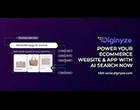
The industrial wholesale distribution landscape is undergoing a significant transformation. Traditional methods, characterized by paper orders, manual processes, and limited customer reach, are struggling to keep pace with the demands of today's digital age. Here the industrial B2B eCommerce emerges as a game-changer, offering a robust solution to overcome these challenges and propel businesses towards growth.

Source: Grand View Research
B2B eCommerce platforms create an online marketplace specifically designed for businesses to conduct transactions with each other. In the context of industrial wholesale distribution, this translates to a user-friendly platform where industrial distributors can showcase their vast catalogs of industrial products - from raw materials and equipment to maintenance supplies and spare parts - to a wider audience of potential buyers.
This article explores how industrial B2B eCommerce empowers distributors to address key challenges, improve efficiency, and unlock new opportunities for success.
Challenges of Traditional Industrial Wholesale Distribution
The traditional model of industrial wholesale distribution faces several limitations that hinder optimal performance:
-
Inefficiencies in Order Processing: Manual processes like paper-based order forms and phone calls are prone to errors and delays. This can lead to frustrated customers, fulfillment mistakes, and wasted time for both distributors and buyers.
-
High Operational Costs: Labor-intensive tasks like order processing, inventory management, and customer service require significant personnel resources. The lack of real-time data insights also hinders informed decision-making, leading to missed opportunities and potential losses.
-
Limited Customer Reach: Traditional methods restrict distributors to a local customer base. Reaching new markets, especially geographically distant ones, can be a complex and costly endeavor.
-
Inflexible Buying Processes: Complex pricing structures, minimum order quantities, and limited visibility into product availability can create frustration for buyers and hinder smooth transactions.
-
Difficulty in Scaling Operations: Manual processes become a bottleneck as businesses grow. Expanding product lines, customer bases, and order volumes can quickly overwhelm traditional systems.
Read Also:From Factory Floor to Online Store How Industrial eCommerce Helps
Benefits of B2B eCommerce for Industrial Distributors
Industrial B2B eCommerce platform addresses these challenges head-on, offering a multitude of benefits for industrial wholesale distributors:
-
Reduced Operating Costs: Investing in an industrial B2B eCommerce platform may seem like an initial expense, but it unlocks significant cost savings in the long run. eCommerce automation streamlines tasks like order processing, inventory management, and marketing. Features like online catalogs, self-service portals, and automatic order fulfillment significantly reduce manual labor requirements. Additionally, advanced AI-powered eCommerce analytics provide valuable heads-up for optimizing operations and eliminating inefficiencies. This translates to a leaner operation and improved profitability for industrial distributors.
-
Increased Accessibility and Mobility: Industrial B2B eCommerce platforms provide 24/7 access for both distributors and their industrial customers. Buyers can browse product catalogs, place orders, track shipments, and access invoices anytime, from anywhere, using a computer, tablet, or smartphone. This flexibility empowers customers to manage their procurement needs efficiently, fostering stronger relationships with distributors.
-
Streamlined Complex Processes: Industrial B2B commerce platforms can handle complex pricing structures and cater to diverse customer needs. Tiered pricing models can be easily configured, and customer portals allow buyers to access personalized pricing and order history. Advanced features like real-time inventory visibility and order tracking improve transparency throughout the buying process. Additionally, data analytics can identify purchasing trends and optimize product recommendations for each customer, leading to more targeted marketing and increased sales.
Read Also:How AI-Driven Search Drives Personalized Recommendations?
-
Reaching New Markets: By removing geographical barriers, industrial B2B eCommerce platforms open doors to new markets. Industrial distributors can showcase their products to a wider audience, both nationally and internationally. This expands the customer base significantly and allows them to capitalize on growing online demand for industrial products. Integration with online marketplaces and streamlined international shipping options further facilitate reaching new customers across borders.
-
Scalability and Growth: Industrial B2B eCommerce platforms are built for scalability. Standardized processes and automation features ensure smooth operation even as businesses grow. Integration with existing ERP systems for seamless data flow. It also eliminates manual data entry, further increasing efficiency. This empowers distributors to expand their product lines, customer base, and order volume without worrying about system limitations.
Read Also:How AI is Reimagining eCommerce for Industrial Distributors?
Implementation Considerations for B2B eCommerce
Before embarking on a B2B eCommerce journey, industrial distributors should consider the following:
-
Choosing the Right Industrial B2B eCommerce Platform: Selecting a platform that aligns with specific business needs is crucial. Factors to consider include features, scalability, budget, and integration capabilities with existing systems.
-
Data Migration and Customer Onboarding: A clear strategy for migrating product data and customer information to the new platform is essential. Additionally, providing proper training and support for customers as the transition to the online buying experience is key.
-
Ongoing Support and Training: Implementing an industrial B2B eCommerce platform requires ongoing support from the platform provider. Look for vendors that offer comprehensive training programs for staff to ensure they can effectively utilize the platform's functionalities.
-
Marketing and Customer Acquisition: Developing a robust eCommerce digital marketing strategy is crucial to attract new customers to the online store. Utilizing search engine optimization (SEO) best practices, engaging in social media marketing, and running targeted online advertising campaigns will increase visibility and drive traffic to the platform.
-
Security: Ensure the industrial B2B eCommerce platform you choose prioritizes eCommerce security. Look for features like secure payment gateways, user authentication protocols, and regular backups to protect sensitive customer and business information.
-
Customer Service: Even with an online platform, excellent customer service remains paramount. Consider integrating AI-powered chatbot to address customer inquiries promptly and efficiently.
Takeaway
The future of industrial B2B eCommerce is bright. As technology continues to evolve, we can expect to see even more advanced features and functionalities. By embracing B2B eCommerce today, industrial distributors can position themselves for success in the ever-evolving digital landscape. They can create a more efficient, customer-centric operation, reach new markets, and ultimately drive sustainable business growth.
By embracing industrial B2B eCommerce platform, distributors can overcome the limitations of traditional methods and unlock a world of new possibilities. From streamlined operations and reduced costs to increased customer reach and market expansion, industrial B2B eCommerce empowers distributors to thrive in the digital age. By taking a proactive approach and implementing a well-defined strategy, industrial distributors can leverage the power of B2B eCommerce to achieve significant growth and solidify their competitive edge.
Ready to transform your wholesale distribution journey? Diginyze is a powerful industrial B2B eCommerce platform that you need to revolutionize your industrial eCommerce business.
Recent Blogs
Explore latest insights and trends in technology and eCommerce.
Case Studies
Your Digital Transformation Starts Here!
Join thousands of businesses transforming with Diginyze. Sign up today and start now!


























